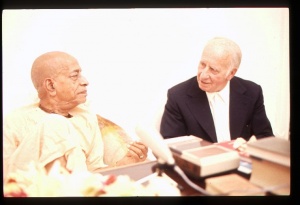CC Madhya 19.164

A.C. Bhaktivedanta Swami Prabhupada
TEXT 164
- eita parama-phala ‘parama-puruṣārtha’
- yāṅra āge tṛṇa-tulya cāri puruṣārtha
SYNONYMS
eita — this; parama-phala — the supreme goal of life; parama — supreme; puruṣa-artha — interest of the living being; yāṅra āge — in the presence of which; tṛṇa-tulya — very insignificant; cāri — four; puruṣa-artha — the different types of human interests.
TRANSLATION
“To taste the fruit of devotional service in Goloka Vṛndāvana is the highest perfection of life, and in the presence of such perfection, the four material perfections—religion, economic development, sense gratification and liberation—are very insignificant achievements.
PURPORT
The highest achievement attained by the jñānīs, or impersonalists, is becoming one with the Supreme, generally known as mokṣa, liberation. The highest achievements of the yogīs are the eight material perfections, such as aṇimā, laghimā and prāpti. Yet these are nothing compared to the eternal bliss of the devotee who returns back to Godhead and tastes the fruit of devotional service to the lotus feet of the Lord. The material perfections, even up to the point of liberation, are very insignificant in comparison; therefore the pure devotee is never interested in such things. His only interest is in perfecting his devotional service to the Lord. The pleasure of the impersonalist, monist philosophers is condemned in the following verse, which is also found in Śrīla Rūpa Gosvāmī’s Lalita-mādhava.